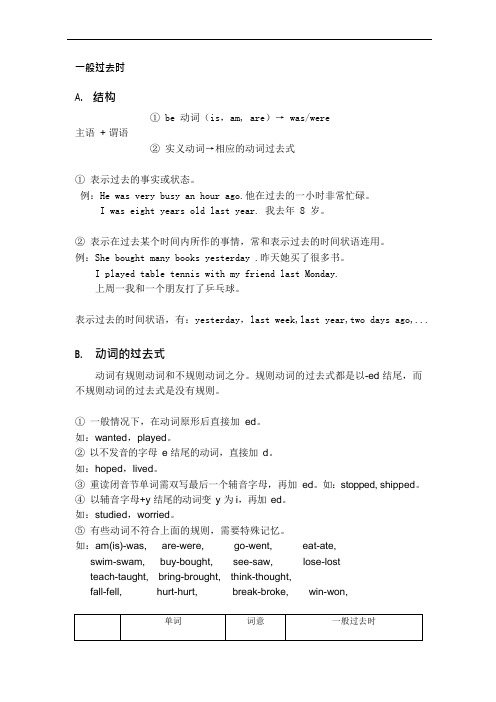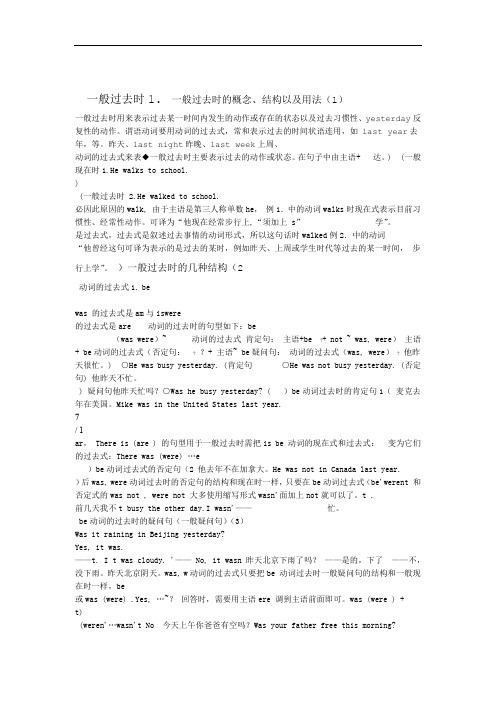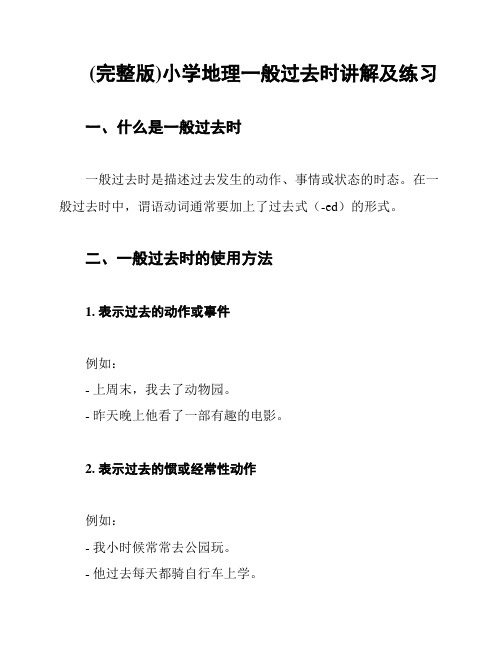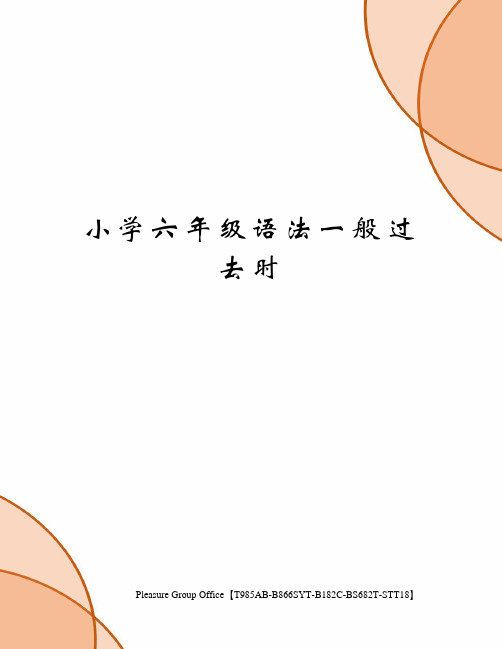(完整word版)小学六年级语法:一般过去时
(word完整版)小学六年级_一般过去式_语法讲解

一,概念表示在过去某个时间里所发生的动作或存在的状态。
通常在句子里找到表示过去时间的词或词组。
如:yesterday, yesterday morning, yesterday afternoon, yesterday evening, the day before yesterday, last night, last week, last month, last year, a moment ago, just now, two days ago, a week ago, in 1990等。
如:I went to bed at eleven last night. 昨晚我11:00睡觉。
二动词过去式的构成规律(一)规则动词的过去式1,一般情况下+,在动词原形后面加-ed;Look--- looked play----played start--- started visit—visited2, 以不发音e结尾的动词,在词尾直接加-d;Live—lived use---used3, 以“辅音字母+y”结尾的动词,先将y 改成i,再加–ed;Study---studied try—tried fly---flied4,以重读闭音节(即辅音+元音+辅音)或 r 音节结尾,末尾只有一个辅音字母的动词,要先双写这个辅音字母后,再加–ed。
Stop---stopped plan---planned preferred(二)不规则动词的过去式1 改变动词中的元音;Begin--- began drink---drank come---came eat---ateGrow---grew run---ran know---knew win---won speak---spokeTake ---took write ---wrote get---got2 变词尾的-d 为-tBuild---built lend---lent send---sent spend--spent bend--bent3 与动词原形一样;Cut---cut put---put cost----cost hurt---hurt shut---shut4 变-ay 为—aid(少数动词)Say---said pay---paid lay---laid5 采用不同词根;Sell--- sold teach----taught buy----bought6 其他Am/is ---was are---were have/has--- had do---did二加–ed 后的读音方法1 ed加在清辅音后面读/t/Finished/-t/ help /-t/ asked/-t/2 ed 加在浊辅音或元音结尾的,读/d/Played/-d/ lived/-d/ enjoyed/-d/3 ed 加在/t/或/d/后面,读/id/Wanted /-tid/ needed/-did/ visited /-tid/过去时练习:写出下列动词的过去式Is\am______ fly___ plant_____ are_____ drink_____Play ______ go____ make______ does_____ dance_____Worry______ ask____ taste_______ eat_____ draw_____Put_____ throw______ kick_______ pass_____ do______用所给动词的适当形式填空1 We_____ (live) in Japan last year.2 Susan_____(stop) the car on the street yesterday.3 My mother____(clean) my room and I _____( study) for the English test last Sunday.4 What____ you_____(do) last night?5 On Saturday morning I ____(play) football二用括号内所给动词的适当形式填空(1)May_____(finish) her homework very late yesterday evening.(2)Han Mei_____(bring) her pet to the park that day.(3)His father______(buy) a new computer for him last week(4)Miss Du______ (walk) to work every day last term.(5)We____(move) to Shenyang 8 years ago.(6)_____ you _________(have) bread for breakfast this morning?(7)She_______(give) me a nice present last night.(8)The police______(stop) the car and_____(catch) the thief (小偷) just now.(9)Tom ____(carry)water for the old man last Saturday.(10)Uncle Wang______(come)into the room and______(find) something to eat.(11)Lily______(study)in the classroom for two hours and then ____(leave).(12)Jimmy______(do) a lot today. He______(go) shopping and _____(cook)supper.(13)We_____(go) to the cinema last night. The film_____(be)very good.(14)What time ______you________(get) to school this morning?三句子变化(一)一般过去时的一般疑问句1.把 was, were放在句首,其余位置不变。
小学英语六年级下册语法专项:一般过去时

写出下列动词的过去式:
go
went
use
think thought live
be
was/ were wake
happen happened keep
give gave
say
become became clean
get got
buy
rain rained play
stay stayed learn
pass passed see
3.频度副词:often ,always 等
例句: ①I got up at 7:00 yesterday. ②My father was at work yesterday afternoon.
③He always went to work by bus last year.
用于一般过去时的时间状语
answer answered read
used lived woke kept said cleaned bought played learnt/ed saw read
run ran borrow borrowed grow grew watch watched write wrote smile smiled open opened begin began swim swam carry carried study studied
一般疑问句: Did they have a good time in the park?
肯定/否定回答: Yes, they did. No , they didn’t.
2. Ann did her homework yesterday evening.
一般疑问句: Did Ann do her homework yesterday evening?
(完整word版)一般过去时及特殊疑问句

一般过去时一、一般过去时的简介:定义:表示过去某时发生的动作或存在的状态.结构:“主语+动词的过去式”用法:1。
表示过去某个时间发生的动作或存在的状态。
He was here yesterday.I got up at seven yesterday morning.My mother was at work yesterday afternoon.Did you have a good time last summer?2。
表示过去经常或反复发生的动作。
My mother often went to work by taxi last year.When I was a student, I often listened to music.3。
常与一般过去时态连用的时间有:at that time, then, at that moment, yesterday, yesterday morning (afternoon, evening…)last night (week, month, year…),一段时间+ago(several days ago), two days ago, a week ago, three years ago…in 1990,(in 1997…) ,just now, long before, long long ago二. 动词过去式构成规则1、一般在动词原形末尾加– edhelp → helped, look → looked, play → played, work → worked, listen → listened, wash →washed, clean → cleaned,2、结尾是 e 的动词加 -- dlive--—lived hope———hoped use-—-used like ——- liked3、末尾只有一个辅音字母的重读闭音节,先双写这个辅音字母,再加-ed。
(完整版)小学英语一般过去时总结(可编辑修改word版)

一般过去时A.结构① be 动词(is,am, are)→ was/were主语+ 谓语②实义动词→相应的动词过去式①表示过去的事实或状态。
例:He was very busy an hour ago.他在过去的一小时非常忙碌。
I was eight years old last year. 我去年 8 岁。
②表示在过去某个时间内所作的事情,常和表示过去的时间状语连用。
例:She bought many books yesterday .昨天她买了很多书。
I played table tennis with my friend last Monday.上周一我和一个朋友打了乒乓球。
表示过去的时间状语,有:yesterday,last week,last year,two days ago,...B. 动词的过去式动词有规则动词和不规则动词之分。
规则动词的过去式都是以-ed 结尾,而不规则动词的过去式是没有规则。
①一般情况下,在动词原形后直接加ed。
如:wanted,played。
②以不发音的字母e 结尾的动词,直接加d。
如:hoped,lived。
③重读闭音节单词需双写最后一个辅音字母,再加ed。
如:stopped, shipped。
④以辅音字母+y 结尾的动词变y 为i,再加ed。
如:studied,worried。
⑤有些动词不符合上面的规则,需要特殊记忆。
如:am(is)-was, are-were, go-went, eat-ate,swim-swam, buy-bought, see-saw, lose-lostteach-taught, bring-brought, think-thought,fall-fell, hurt-hurt, break-broke, win-won,直接加edwalk 走climb 爬turn 转弯learn 学习cook dinner 做饭play the piano 弹钢琴visit grandparents 看望(外)祖父母clean the bedroom 打扫卧室wash the clothes 洗衣服answer the phone 接电话listen to music 听音乐clean the room 打扫房间collect insects 收集昆虫jump 跳row 划work 工作show 展示look 看help 帮助relax 放松return 归还pass 传递watch insects 观察昆虫pick up leaves 采摘树叶paint 绘画kick 踢ski 滑雪直接加dlike 像,喜欢live 居住dance 跳舞use a computer 使用计算机love 爱taste 尝close 关上prepare 准备不规则变化eat 吃have 有;吃buy 买take 买;带go 去sing 唱歌teach(taught)教run(ran)跑fight(fought)打架get up 起床swim 游泳fly 飞swing(swung)荡sleep(slept)睡觉sweep(swept) the floor 扫地do 做make the bed 铺床draw(drew) pictures 画画write(wrote) a letter 写信catch(caught)butterflies 捉蝴蝶meet(met) 见面drink(drank)喝tell(told)告诉ride(rode)骑find(found)寻找到drive(drove)驾驶come(came)来become(became)变成feel(felt)感觉到think(thought)思考meet(met)遇见fall(fell)落下leave 离开wake(woke) up 醒来bring 带来is am are see 看到grow 种植grew stand(stood)站立词形不变read books 读书put 放set the table 摆饭桌hit (hit)撞击、打cut 切、割最后一个字母双写再加edstop(stopped)停shop 购物把y 变成i 再加edempty the trash 倒垃圾study 学习C. 过去式的肯定、否定、疑问及简短回答①过去式的肯定、否定、疑问及简短回答的形式可表示如下:肯定句I (He, She, We, You, They) went there by bus.否定句I (He, She, We, You, They) didn't go there by bus.疑问句Did I (he, she, we, you ,they) go the by bus?简短回答Yes, I (He, She, We, You, They) did.No, I (He, She, We, You, They) didn't.动词be 的肯定、否定、疑问及简短回答形式如下:肯定句I (He, She) was there.We (You, They) were there.否定句I (He, She) wasn't there.We (You, They) weren't there疑问句Was I (he, she) there?Were we (you, they) there?简短回答No, I (he, she) wasn't.we (you, they) weren't.一、将下列动词变成过去式。
(完整版)一般过去时的概念及用法

一般过去时的概念及用法一、基本概念一般过去时(simple past tense)表示过去某个时间里发生的非持续性动作或存在的状态,也表示经常或反复发生的动作。
用动词的过去式表示,常和表示过去的时间状语连用,如:yesterday,last night,in 1990,two days ago,before,the age of等。
一般过去时也表示过去经常或反复发生的动作,常和often,always等表示频率的时间状语连用。
表示过去习惯性、经常性的动作、行为;过去主语所具备的能力和性格。
二、动词变化1.直接加ed: work—- worked look——looked2.以不发音e结尾的单词,直接加d: live ——lived hope-—hoped use——used3.以辅音字母+y结尾的,变y为i加ed: study——studied carry—-carried worry--worried 4.以一个辅音字母结尾的,双写最后的辅音字母+ed: stop—— stopped plan-—planned重读闭音节体现形式为辅-元-辅结构,例如nod, n为辅音,o为元音,d为辅音。
5。
以ic结尾的动词,要把ic变成ick再加ed,如picnic→picnicked,traffic→traffic ked 6.不规则变化的动词过去式:have---had are-—-were get-—-got say--—said feel——-felt do/does———did is---was go—--went drink——drank eat—-ate bring-———brought think-—--thought buy----bought catch--—- caught teach ---—taught sit-———sat wear—--—wore cut———-cut sweep----swept sleep-—slept see--——saw become-—-—became read-—read7.以辅元辅结尾的加d三、用法(1)一般过去时表示在过去某个特定时间发生,也可以表示过去习惯性、经常性的动作.一般不强调动作的影响,只说明的事情。
完整word版一般过去时讲解

一般过去时1.一般过去时的概念、结构以及用法(1)一般过去时用来表示过去某一时间内发生的动作或存在的状态以及过去习惯性、yesterday反复性的动作。
谓语动词要用动词的过去式,常和表示过去的时间状语连用,如 last year去年,等。
昨天、last night昨晚、last week上周、动词的过去式来表◆一般过去时主要表示过去的动作或状态。
在句子中由主语+ 达。
) (一般现在时1.He walks to school.)(一般过去时 2.He walked to school.必因此原因的walk, 由于主语是第三人称单数he,例1.中的动词walks时现在式表示目前习惯性、经常性动作。
可译为“他现在经常步行上,“须加上 s”学”。
是过去式,过去式是叙述过去事情的动词形式,所以这句话时walked例2.中的动词“他曾经这句可译为表示的是过去的某时,例如昨天、上周或学生时代等过去的某一时间,步行上学”。
)一般过去时的几种结构(2动词的过去式1.bewas 的过去式是am与iswere的过去式是are 动词的过去时的句型如下:be(was were)~ 动词的过去式肯定句:主语+be ?+ not ~ was, were)主语+ be动词的过去式(否定句:??+ 主语~ be疑问句:动词的过去式(was, were)?他昨天很忙。
) ○He was busy yesterday. (肯定句○He was not busy yesterday. (否定句) 他昨天不忙。
) 疑问句他昨天忙吗?○Was he busy yesterday? ( )be动词过去时的肯定句1(麦克去年在美国。
Mike was in the United States last year.7/ 1ar, There is (are ) 的句型用于一般过去时需把is be 动词的现在式和过去式:变为它们的过去式:There was (were) …e)be动词过去式的否定句(2 他去年不在加拿大。
年小学六年级英语一般过去时的复习

年小学六年级英语一般过去时的复习在小学六年级的英语学习中,一般过去时是一个非常重要的语法点。
对于即将升入初中的同学们来说,熟练掌握一般过去时对于进一步提高英语水平至关重要。
接下来,让我们一起系统地复习一下一般过去时。
一般过去时表示过去某个时间发生的动作或存在的状态。
它常常和表示过去的时间状语连用,比如 yesterday(昨天)、last week(上周)、last month(上个月)、last year(去年)、two days ago(两天前)、in 2010(在 2010 年)等等。
一般过去时的构成主要有两种情况。
第一种是 be 动词的一般过去时。
am/is 对应的过去式是 was,are 对应的过去式是 were。
例如:I was at home yesterday(昨天我在家。
)They were very happy last week(上周他们非常开心。
)第二种是实义动词的一般过去时。
实义动词的过去式分为规则变化和不规则变化。
规则变化通常有以下几种情况:1、一般情况下,直接在动词词尾加 ed,比如 play played 。
2、以不发音的字母 e 结尾的动词,在词尾加 d,例如 like liked 。
3、以重读闭音节结尾,且末尾只有一个辅音字母的动词,先双写这个辅音字母,再加 ed,比如 stop stopped 。
4、以“辅音字母+y”结尾的动词,先把 y 变为 i,再加 ed,例如study studied 。
而不规则变化的动词就需要同学们特别记忆了,比如:go went ,come came ,do did ,have had ,see saw 等等。
在句子中,一般过去时的否定句和疑问句也有其特定的构成方式。
否定句:如果是 be 动词,直接在 was/were 后加 not;如果是实义动词,要借助 didn't,并且动词要变回原形。
例如:I wasn't at school yesterday (昨天我不在学校。
(完整word版)一般过去时详解(重点)

一、一般过去时的概念:一般过去时用来表示过去某一时间内发生的动作或存在的状态以及过去习惯性、反复性的动作。
谓语动词要用动词的过去式,常和表示过去的时间状语连用,如yesterday昨天、last night昨晚、last week上周、last year去年,等。
二、一般过去时的结构:(可分三类不同的结构)1.Be动词的一般过去时在没有实义动词的句子中使用be动词, am is 的过去式为was; are的过去式为were肯定句式:主语 + be(was , were) + 其它.否定句式:主语 + be(was , were) + not + 其它.一般疑问句:Be(was , were) + 主语 + 其它?注:在这种构成中,be动词有人称和数的变化,即要根据主语选用was / were。
Be动词分为单数和复数,was是表示单数,were是表示复数。
2. 实义动词的一般过去时态肯定句要使用动词的过去式,否定句和疑问句要使用助动词do和 does 的过去式 did.肯定句式:主语 + 动词(过去式)+ 其它否定句式:主语 + didn’t + 动词(原形)+ 其它【did not = didn’t】一般疑问句:Did + 主语+ 动词(原形)+ 其它【do , does的过去时均为did】?注:did和didn’t是构成一般过去时的助动词,其特点是要在其后跟动词的原形。
3. 情态动词的一般过去时态含有情态动词的一般过去时与含有Be动词的一般过去时,是十分相似,请注意观察。
肯定句式:主语 + 情态动词 + 其它.否定句式:主语 + 情态动词 + not + 其它.一般疑问句:情态动词 + 主语 + 其它?注:情态动词的过去式:can→could , may→might , must→must,will-would,should-should.4.特殊疑问句式:特殊疑问词+be过去式+主语+其他?特殊疑问词+情态助动词过去式+主语+动词原形+其他?特殊疑问词+do/does过去式+主语+动词原形+其他?What was your former name?你以前叫什么名字?Why did he late for school last Monday?上星期一他为什么迟到?What could she do twenty years ago?20年前她能做什么?三、一般过去时的判断标志词yesterday , the day before yesterday , last + 时间 , this morning时间 + ago , just now , a moment ago , in + 过去的时间 .四、规则动词的过去式1.一般情况下,在动词原形后面加-ed。
一般过去时 六年级英语知识点

一般过去时(小学)一、定义1.表示过去某个时间发生的动作或存在的状态。
如:She ate three apples yesterday. 昨天她吃了三个苹果。
I got up at 6:30 yesterday. 我昨天6:30起床。
My father was very busy last week.我父亲上周很忙。
2.表示过去经常或过去反复发生的动作(也可与often,always等频率副词连用)。
如:He always got up very early when he was young.年轻的时候,他每天总是起得很早。
二、谓语形式:动词的过去式(1)She was a student two years ago. 两年前她是一个学生。
(这件事情已经过去了,所以be动词is要用过去式was)(2)they were students two years ago. 两年前他们/她们是学生。
(这件事情已经过去了,所以be动词are要用过去式were)(3) Ann washed her clothes last night. 安昨晚洗了她的衣服。
(这件事情已经过去了,所以动词wash要用过去式washed)(4) I did my homework promptly. 我及时地完成了作业。
(这件事情已经过去了,所以动词do要用过去式did)三、句子结构:(a) be 动词的过去式句型: (b)动词过去式句型:(a) be 动词的过去式句型:1.肯定句:主语+be 动词(was , were)+其他,如:She was a student two years ago. 两年前她是一个学生。
2.否定句:主语+be not(was not, were not)+其他,如:She was not a student two years ago. 两年前她不是一个学生。
3.一般疑问句:Be动词(Was/Were)+主语+其他?肯定回答为“Yes,主语+was/were”,否定回答为“No,主语+wasn’t/weren’t”。
小学语法经典总结---一般过去时1Microsoft Word 文档

1.一般过去时表示过去发生的动作或存在的状态,通常与过去的时间状语连用:yesterday ,last week(month,year)(1)系动词be的过去时: am(is) →was, are →were陈述句:He was at home yesterday.否定句:He wasn’t at home yesterday.疑问句:Was he at home yesterday?Yes ,he was./No ,he wasn’t.(2)行为动词的一般过去时:陈述句:主语+动词过去式+其它I go to the movie. →I went to the movie.否定句:主语+助动词didn’t+动词原形+其它I don’t go to school today. →I didn’t go to school. 一般疑问句:Did +主语+动词原形+其它Do you have breakfast? →Did you have breakfast? Yes,I do./No,I don’t. Yes,I did./No,I didn’t.(3)规则动词的过去式变化规则变化规则例词一般在词尾加—ed. play→played以不发音的e结尾的,只加--d. like →likedlove →loved以辅音字母+y 结尾的,变y为i ,再加—ed. study →studiedcarry →carried以一个辅音字母结尾的重读闭音节,先双写这个辅音字母,再加-ed stop →stopped plan →planned动词不规则变化:do →did have →had go →wentsee →saw read →read get →gotgive →gave sleep →slept eat →atewrite →wrote find_---found2. what’s the date today? It’s …3. What was the date yesterday? It was…4. What’s the weather like today? It’s …?5. How was your weekend?6.What did she do ? She did her homework7.What did he do last weekend ? He played soccer.8.It’s time to go home= It’s time for home。
(完整word版)小学六年级英语一般过去时

第十七讲一般过去时一.观点一般过去时表示过去某个时间发生的动作或存在的状态,常和表示过去的时间状语连用。
一般过去时也表示过去常常或频频发生的动作。
例句:1.I watched TV last night.我昨天夜晚看电视。
2.What did you do yesterday?你昨天做了什么?3.They went to Beijing last year.他们昨年去了北京。
二.用法1.表示过去发生的动作或状态,往常会有明确的表示过去的时间状语。
I went to the zoo yesterday.I stayed up last night.2.表达过去连续发生的动作或状态。
This morning , I got up early , went out for a walk , then came back and cooked formy family .3.表示过去某一段不确立的时间内发生的动作或状态。
He worked in the store for 5 years.三. Be 动词在一般过去时中的变化1. am 和 is 在一般过去时中变成was 。
( was not=wasn't)2. are 在一般过去时中变成were 。
( were not=weren't )was 或3.带有 was 或 were 的句子,其否认、疑问的变化和is, am, are 同样,即否认句在were 后加 not ,一般疑问句把was 或 were 调到句首。
四.句中没有be 动词的一般过去时的句子1.否认句: didn't + 动词原形,如:Jim didn't go home yesterday.2.一般疑问句:在句首加did ,句子中的动词过去式变回原形。
如:Did Jim go home yesterday?3.特别疑问句:疑问词+一般疑问句?如:What did Jim do yesterday?五.动词过去式变化规则1.一般在动词末端加-ed,如: pull-pulled, cook-cooked2.结尾是 e 加 d,如: taste-tasted3.末端是辅音字母加一个元音字母和一个辅音字母的重读闭音节,应双写末端的辅音字母,再加-ed ,如: stop-stopped4.以“辅音字母+y ”结尾的,变y 为 i,再加 -ed ,如: study-studied六.真题再现() 1. The boythe tree last week.A.is watering2.I _____(see) his name in the newspaper yesterday.由于句中出现了表示过去的时间状语last week 和 yesterday ,因此正确答案分别为: 1. C精点精练一、用动词的适合形式填空。
(完整版)小学地理一般过去时讲解及练习

(完整版)小学地理一般过去时讲解及练习一、什么是一般过去时一般过去时是描述过去发生的动作、事情或状态的时态。
在一般过去时中,谓语动词通常要加上了过去式(-ed)的形式。
二、一般过去时的使用方法1. 表示过去的动作或事件例如:- 上周末,我去了动物园。
- 昨天晚上他看了一部有趣的电影。
2. 表示过去的惯或经常性动作例如:- 我小时候常常去公园玩。
- 他过去每天都骑自行车上学。
3. 表示过去的状态或条件例如:- 他以前是个优秀的学生。
- 我们过去住在一个小村庄里。
三、一般过去时的构成方式一般过去时的肯定句构成方式为:主语 + 过去式谓语动词 + 其他成分。
例如:- They played baseball in the park.(他们在公园里打棒球。
)一般过去时的否定句构成方式为:主语 + did not + 原形动词 + 其他成分。
例如:- She did not watch TV last night.(她昨晚没有看电视。
)一般过去时的疑问句构成方式为:Did + 主语 + 原形动词 + 其他成分?例如:- Did he go to the zoo?(他去动物园了吗?)四、一般过去时的练题请根据下面的句子,选择正确的动词形式填入空格中。
1. We ____(play/played) tennis last Sunday.2. I ____(visit/visited) my grandparents yesterday.3. The cat ____(sleep/slept) all day yesterday.4. She ____(go/went) to the beach with her friends.5. They ____(watch/watched) a movie at the cinema last night.答案:1. played2. visited3. slept4. went5. watched注意:以上为简单练,供参考使用。
小学六年级语法一般过去时

小学六年级语法一般过去时Pleasure Group Office【T985AB-B866SYT-B182C-BS682T-STT18】教案学设计一般过去时1.一般过去时表示过去某个时间发生的动作或存在的状态,常和表示过去的时间状语连用。
一般过去时也表示过去经常或反复发生的动作。
常用的时间状语:yesterday, just now , a moment ago , last week,last year,last Friday,last National Day holiday,the day before yesterday... 2.Be动词在一般过去时中的变化:⑴am 和is在一般过去时中变为was。
(was not=wasn’t)⑵are在一般过去时中变为were。
(were not=weren’t)⑶带有was或were的句子,其否定、疑问的变化和is, am, are一样,即否定句在was或were后加not,一般疑问句把was或were调到句首。
3.句中没有be动词的一般过去时的句子否定句:didn’t +动词原形,如:Jim didn’t go home yesterday.一般疑问句:在句首加did,句子中的动词过去式变回原形。
如:Did Jim go home yesterday特殊疑问句:⑴疑问词+did+主语+动词原形如: What did Jim do yesterday⑵疑问词当主语时:疑问词+动词过去式如:Who went home yesterday动词过去式变化规则:1.一般在动词末尾加-ed,如:pull-pulled, cook-cooked ,shout-shouted ,point-pointed,2.结尾是e加d,如:taste-tasted , like-liked3.末尾只有一个元音字母和一个辅音字母的重读闭音节,应双写末尾的辅音字母,再加-ed,如:stop-stopped4.以“辅音字母+y”结尾的,变y为i,再加-ed,如:study-studied5.不规则动词过去式: am,is-was, are-were, do-did, see-saw, say-said, give-gave, get-got, go-went, come-came, have-had, eat-ate, take-took, run-ran, sing-sang, put-put, make-made, read-read, write-wrote, draw-drew, drink-drank, fly-flew, ride-rode, speak-spoke, sweep-swept, swim-swam, sit-sat ,become-became, take-took,can-could,swim-swam, bring-brought,drive-drove过去时练习:写出下列动词的过去式is\am_________ fly_______ plant________ are ________ drink_________play_______ go________ make ________ does_________ dance________worry________ ask _____ taste_________ eat__________ draw________put ______ throw________ kick_________ pass_______ do ________Be动词的过去时练习一、用be动词的适当形式填空。
最新小学六年级英语一般过去式语法知识点

医院健康扶贫
实施方案
健康扶贫是打赢脱贫攻坚战、实现农村贫困人口脱贫的重大举措,是精准扶贫、精准脱贫基本方略的重要实践,为扎实推进医院健康扶贫各项工作顺利开展,特制定本实施方案。
一、主要目标
紧紧围绕让农村贫困人口“看得起病、看得好病、看得上病、更好防病”要求,进一步健全大病保险制度和重大疾病救治制度,农村贫困人口大病得到及时有效救治和保障,个人就医费用负担大幅减轻;大力开展健康促进活动,优化贫困地区医疗卫生服务,加强贫困人口健康管理,提升医疗卫生服务水平;加强基层医疗卫生服务体系建设,明显提高贫困地区医疗服务的公平性和可及性。
到2020年,贫困地区人人享有基本医疗卫生服务,因病致贫、因病返贫问题得到有效解决。
二、组织领导
为了深化医改的重要任务安排部署,切实把此项任务落到实处,要求成立健康扶贫工作领导小组,具体负责健康扶贫工程的方案制定、组织实施和考核督查工作,逐项抓好健康扶贫工作任务落实。
领导小组如下:
组长:xxxx
副组长:xxxx、xxxxx
成员:xxxx、xxxx、xxxx、各科室主任和护士长。
(完整word版)一般过去时语法总结(1),推荐文档

重点语法
一般过去时
1.定义:表示过去发生的事情。
2.一般过去式be动词用was,were。
3.一般过去时动词要用过去式,动词变过去式规则:
1)一般直接加ed.
2)以不发音的e结尾直接加d.
3)辅音+y结尾,把y改i+ed.
4)辅元辅,倒着数,双写最后的字母+ed.
4.一般过去时关键词:
yesterday(昨天),last year(去年),last month(上个月),last night(昨晚),last week(上周),three days ago(三天前),in+过去年份(如in 2001),this morning(今天早上)等等。
5. 不规则动词的过去式形式:
6.一般过去式一般疑问句:
be动词was,were时,把was,were放在句首。
Was there any +可数名词单数或不可数名词....? Yes, there was./No, there wasn’t.
Were there any+可数名词复数.....?
Yes, there were./No, there weren’t.
有动词时变一般疑问句,把Did放句首,动词恢复原形。
Did+主语+动词原形....?
Yes,...did./No,...didn’t.
7.一般过去时的特殊疑问句形式:
What did+主语+动词原形...?
回答:主语+动词过去式...。
小学六年级一般过去时简单总结

一般过去时1.一般过去时表示过去某个时间发生的动作或存在的状态,常和表示过去的时间状语连用。
如:last week , last year , yesterday 等,也可以表示过去经常发生的动作,常和often,always 等频率副词连用。
例如:I saw him in the supermarket yesterday. 昨天我在超市里看见他了。
Mike always went to school on foot last term. 上学期迈克总是步行上学。
2.句型:询问在过去的某一个时间做了什么,借助助动词did 。
特殊疑问句——What did you do yesterday / last weekend ? ——I did my homework .一般疑问句,把did提前——Did you help your parents clean the room ? ( 当句子变为一般疑问句,动词应还原成动词原形) ——Yes , I did ./No, I didn’t .一般过去时1. 一般过去时表示过去某个时间发生的动作或存在的状态,常和表示过去的时间状语连用。
如:last week , last year , yesterday 等,也可以表示过去经常发生的动作,常和often,always 等频率副词连用。
例如:I saw him in the supermarket yesterday. 昨天我在超市里看见他了。
Mike always went to school on foot last term. 上学期迈克总是步行上学。
2.句型:询问在过去的某一个时间做了什么,借助助动词did 。
特殊疑问句——What did you do yesterday / last weekend ? ——I did my homework .一般疑问句,把did提前——Did you help your parents clean the room ? ( 当句子变为一般疑问句,动词应还原成动词原形) ——Yes , I did ./No, I didn’t .。
(word完整版)一般现在时-现在进行时-一般将来时-一般过去时

一般现在时一、含义:)的特征、状态,主语+be(am/is/ are)+其他主语+be(am/is/ are)+not+其他主语(非三单)+动词原形+其他主语(非三单)+don’t+动词原形+其他主语(三单)+动词三单形式+其他主语(三单)+doesn't+动词原形+其他always、usually、often、等频率副词;every week(day、year…)、once a week,on Sunday等时间状语;三、第三人称单数形式构成规则:1、大多数动词在词尾加“S"如:read-reads以不发音字母“e"结尾的开音节词,加“s” 如: make-makes2、以“s, x, ch, sh,o"结尾的,在词尾加“es”如: go-goes, guess—guesses, fix-fixes3、以辅音字母加“y”结尾的,要先将“y”变为“i"再加“es”,如: fly-flies,carry—carries, worry-worries, study—studies以元音字母加“y”结尾的,直接加“S”,如: play-plays, stop—stops, say-says4、特殊:错误!be动词包括:am, is, are第三人称单数为is 错误!have -has四、写出下列动词的第三人称单数形式:visit-— guess-- take-— go—- rush-—feel——cook——wash——fly-- be--say-—run——do—— worry-—live-—watch-—enjoy—- have——like—- play--use-— teach--buy-- study-—drink—— stay--make—— plant——trip-- carry--come——cry--五、用括号内动词的适当形式填空。
1. She often __________ (have)lunch at home。
语法之一般过去式(小学6年级)

语法项目之一般过去时--- K.Fischer一、一般过去时的用法:1. 表示过去的动作或状态,常和明确的过去时间状语连用.如:yesterday, last week, three days ago, in 1998,just now等,或与由when引导的从句连用。
例:I learned English Grammar last week. 上周我学习了英语语法。
2. 也可以表示过去某一段时间内经常或反复出现的动作。
句子中常带有every day, often, usually, always, sometimes等时间状语。
例:When I went to the middle school, I got up early every morning.当我上中学的时候,我每天都起的很早。
In the past few years, she usually went to the beach every holiday.在过去的几年里,她每逢假期都要去海滩。
二、一般过去时的形式:1. 主语+was/were+_____例: Jack was five years old in 2003.2. 主语+ 动词(ed)/动词(特殊变化)+_______例:I jumped on the bed yesterday.动词的过去式形式:①是规则动词(后面加ed),②不发音字母“e”结尾,直接加“ed”,如:like – liked, hope-hoped, taste-tasted.③以“辅音字母+y”结尾时,变“y”为“i”再加“ed”,如:try – tried, carry – carried, study – studied ;附表:小升初阶段所有必会的不规则动词:Infinitive Past tense Infinitive Past tense 1. am, is was 2. keep k e pt3. are were4. let let5. become bec a me6. make ma d e7. begin beg a n8. meet m e t9. bite b i t 10. put put11. blow bl e w 12. read read 13. buy b ough t14. ride r o de 15. catch c augh t 16. run r a n17. come c a me 18. say s ai d19. cost cost 20. see s aw21. cut cut 22. sing s a ng 23.dig d u g24. sit s a t25.do d i d 26. sleep sl e pt 27. draw dr e w 28. speak sp o ke 29. drink dr a nk30. sweep sw e pt 31. eat ate32. take t oo k 33. fall f e ll 34.teach t augh t 35. feed f e d36. tell t o ld37.feel f e lt 38.think th ough t 39. fly fl ew40. throw thr e w 41.forget forg o t 42.understand underst oo d 43. get g o t 44. give g a ve 45. wake w o ke 46. go went 47. wear w ore48. grow gr e w 49. win w o n 50. have/has h a d 51. write wr o te 52. know kn e w。
(word完整版)小学六年级语法:一般过去时(2021年整理)

(word完整版)小学六年级语法:一般过去时(word版可编辑修改) 编辑整理:尊敬的读者朋友们:这里是精品文档编辑中心,本文档内容是由我和我的同事精心编辑整理后发布的,发布之前我们对文中内容进行仔细校对,但是难免会有疏漏的地方,但是任然希望((word完整版)小学六年级语法:一般过去时(word版可编辑修改))的内容能够给您的工作和学习带来便利。
同时也真诚的希望收到您的建议和反馈,这将是我们进步的源泉,前进的动力。
本文可编辑可修改,如果觉得对您有帮助请收藏以便随时查阅,最后祝您生活愉快业绩进步,以下为(word完整版)小学六年级语法:一般过去时(word版可编辑修改)的全部内容。
教案教学设计一般过去时1.一般过去时表示过去某个时间发生的动作或存在的状态,常和表示过去的时间状语连用。
一般过去时也表示过去经常或反复发生的动作。
常用的时间状语:yesterday, just now , a moment ago , last week,last year,last Friday,last National Day holiday,the day before yesterday.。
.2.Be动词在一般过去时中的变化:⑴am 和is在一般过去时中变为was.(was not=wasn’t)⑵are在一般过去时中变为were。
(were not=weren’t)⑶带有was或were的句子,其否定、疑问的变化和is, am, are一样,即否定句在was或were后加not,一般疑问句把was或were调到句首。
3.句中没有be动词的一般过去时的句子否定句:didn’t +动词原形,如:Jim didn't go home yesterday. 一般疑问句:在句首加did,句子中的动词过去式变回原形。
如:Did Jim go home yesterday?特殊疑问句:⑴疑问词+did+主语+动词原形?如:What did Jim do yesterday?⑵疑问词当主语时:疑问词+动词过去式?如:Who went home yesterday?动词过去式变化规则:1.一般在动词末尾加—ed,如:pull-pulled, cook—cooked ,shout —shouted ,point—pointed,2.结尾是e加d,如:taste-tasted , like-liked3.末尾只有一个元音字母和一个辅音字母的重读闭音节,应双写末尾的辅音字母,再加—ed,如:stop-stopped4.以“辅音字母+y”结尾的,变y为i,再加—ed,如:study-studied 5.不规则动词过去式: am,is-was, are-were, do—did, see-saw,say—said, give-gave, get-got, go-went, come—came, have—had, eat—ate, take-took, run—ran, sing-sang, put—put,make-made, read—read, write—wrote, draw-drew, drink—drank,fly-flew, ride—rode, speak-spoke, sweep-swept, swim-swam, sit—sat ,become—became, take—took,can-could,swim-swam, bring—brought,drive-drove过去时练习:写出下列动词的过去式is\am_________ fly_______ plant________ are ________drink_________play_______ go________ make ________ does_________ dance________ worry________ ask _____ taste_________ eat__________ draw________ put ______ throw________ kick_________ pass_______ do ________ Be动词的过去时练习一、用be动词的适当形式填空。
- 1、下载文档前请自行甄别文档内容的完整性,平台不提供额外的编辑、内容补充、找答案等附加服务。
- 2、"仅部分预览"的文档,不可在线预览部分如存在完整性等问题,可反馈申请退款(可完整预览的文档不适用该条件!)。
- 3、如文档侵犯您的权益,请联系客服反馈,我们会尽快为您处理(人工客服工作时间:9:00-18:30)。
教案教学设计一般过去时1.一般过去时表示过去某个时间发生的动作或存在的状态,常和表示过去的时间状语连用。
一般过去时也表示过去经常或反复发生的动作。
常用的时间状语:yesterday, just now , a moment ago , last week,last year,last Friday,last National Day holiday,the day before yesterday... 2.Be动词在一般过去时中的变化:⑴am 和is在一般过去时中变为was。
(was not=wasn’t)⑵are在一般过去时中变为were。
(were not=weren’t)⑶带有was或were的句子,其否定、疑问的变化和is, am, are一样,即否定句在was或were 后加not,一般疑问句把was或were调到句首。
3.句中没有be动词的一般过去时的句子否定句:didn’t +动词原形,如:Jim didn’t go home yesterday.一般疑问句:在句首加did,句子中的动词过去式变回原形。
如:Did Jim go home yesterday? 特殊疑问句:⑴疑问词+did+主语+动词原形?如:What did Jim do yesterday?⑵疑问词当主语时:疑问词+动词过去式?如:Who went home yesterday?动词过去式变化规则:1.一般在动词末尾加-ed,如:pull-pulled, cook-cooked ,shout-shouted ,point-pointed,2.结尾是e加d,如:taste-tasted , like-liked3.末尾只有一个元音字母和一个辅音字母的重读闭音节,应双写末尾的辅音字母,再加-ed,如:stop-stopped4.以“辅音字母+y”结尾的,变y为i,再加-ed,如:study-studied5.不规则动词过去式:am,is-was, are-were, do-did, see-saw, say-said, give-gave, get-got,go-went, come-came, have-had, eat-ate, take-took, run-ran, sing-sang, put-put, make-made,read-read, write-wrote, draw-drew, drink-drank, fly-flew, ride-rode, speak-spoke, sweep-swept, swim-swam, sit-sat ,become-became, take-took,can-could,swim-swam, bring-brought,drive-drove过去时练习:写出下列动词的过去式is\am_________ fly_______ plant________ are ________ drink_________play_______ go________ make ________ does_________ dance________worry________ ask _____ taste_________ eat__________ draw________put ______ throw________ kick_________ pass_______ do ________Be动词的过去时练习一、用be动词的适当形式填空。
1. I ______ an English teacher now.2. She _______ happy yesterday.3. They _______ glad to see each other last month.4. Helen and Nancy ________ good friends.5. The little dog _____ two years old this year.6. Look, there ________ lots of grapes here.7. There ________ a sign on the chair on Monday.8. Today _____ the second of June. Yesterday ______ the first of June. It _____ Children’s Day. All the students______ very excited.二、句型转换。
1. There was a car in front of the house just now.否定句:________________________________________________一般疑问句:____________________________________________肯、否定回答:__________________________________________2.I went to the park last weekend.(改为一般疑问句) ________________________________________________________(改为否定句)_________________________________________________________三、中译英。
1.我的故事书刚才还在手表旁边。
___________________________________________________________ 2.他们的外套上个礼拜放在卧室里了。
___________________________________________________________ 3.一会以前花园里有两只小鸟。
___________________________________________________________行为动词的过去时练习一、用be动词的适当形式填空。
1. I ______ (watch) a cartoon on Saturday.2. Her father _______ (read) a newspaper last night.3. We _________ to zoo yesterday, we _____ to the park. (go)4. ______ you _______ (visit) your relatives last Spring Festival?5. ______ he _______ (fly) a kite on Sunday? Yes, he ______.6. Gao Shan _______ (pull) up carrots last National Day holiday.7. I ____________ (sweep) the floor yesterday, but my mother ______.8. What ______ she _______ (find) in the garden last morning? She __________ (find) a beautiful butterfly.二、句型转换。
1. They played football in the playground.否定句:________________________________________________一般疑问句:____________________________________________肯、否定回答:__________________________________________过去时综合练习(1)一、用动词的适当形式填空。
1. It ______ (be) Ben’s birthday last Friday.2. We all ______ (have) a good time last night.3. He ________ (jump) high on last Sports Day.4. Helen ________ (milk) a cow on Friday.5. She likes ______ newspapers, but she ______ a book yesterday. (read)6. He _______ football now, but they _______ basketball just now. (play)7. Jim’s mother _________ (plant) trees just now.8. _______ they ________ (sweep) the floor on Sunday? No, they _____.9. I _______ (watch) a cartoon on Monday.10. We ___________ (go) to school on Sunday.过去时综合练习一、用动词的适当形式填空。
1. It _____ (be) the 2nd of November yesterday. Mr White ________ (go) to his office by car.2. Gao Shan ________ (put) the book on his head a moment ago.3. Don’t ______ the house. Mum _______ it yesterday. (clean)4. What ____ you ______ just now? I _______ some housework. (do)5. They _________ (make) a kite a week ago.6. I want to ______ apples. But my dad _______ all of them last month. (pick)7. _______ he ______ the flowers this morning? Yes, he _____. (water)8. She ____ (be) a pretty girl. Look, she _____ (do) Chinese dances.9. The students often _________ (draw) some pictures in the art room.10.What ______ Mike do on the farm? He ________ cows. (milk)二、中译英。
